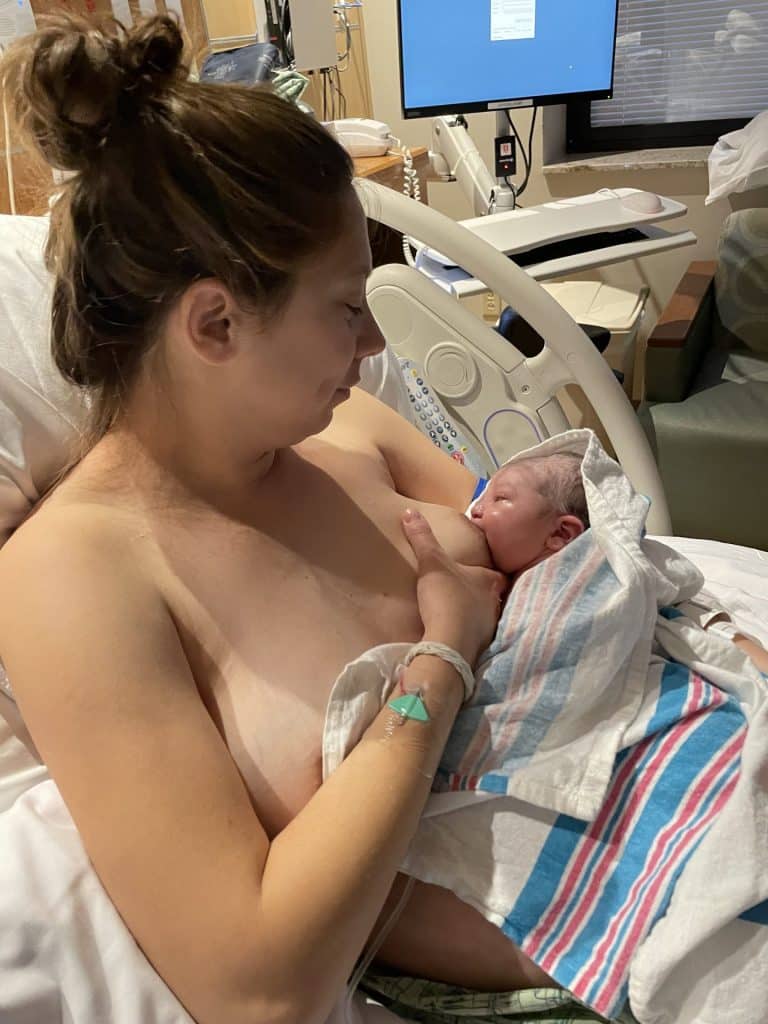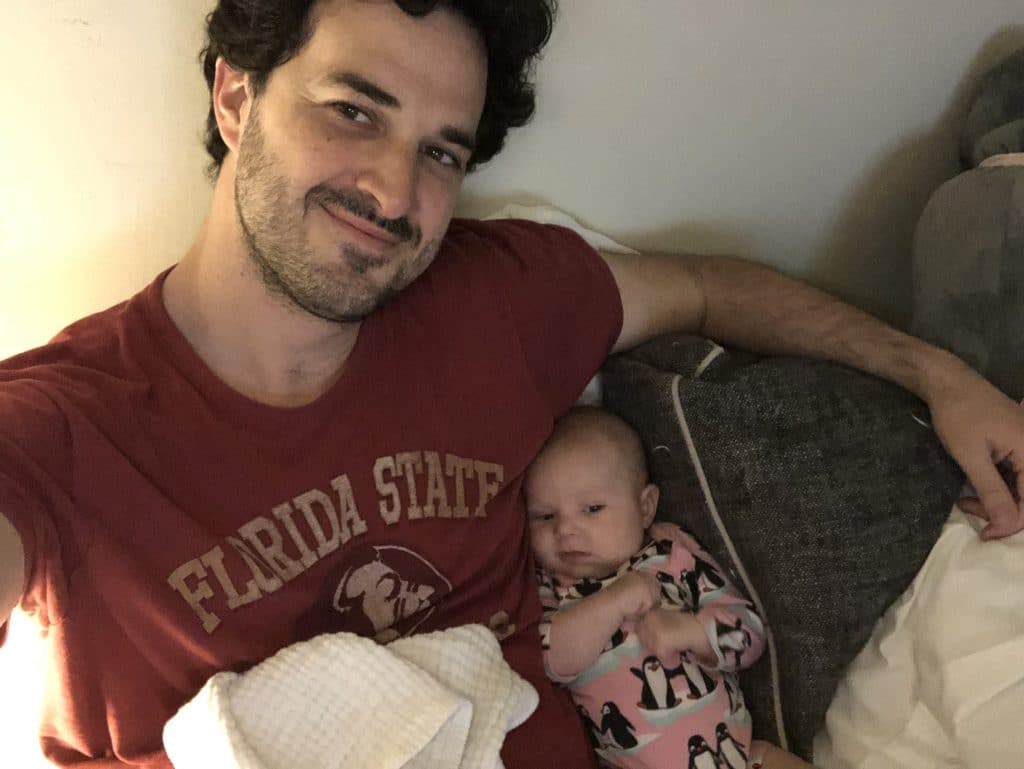We are proud to say that these posts are not sponsored. Our editorial team of Bobbie moms and writers personally select each featured product. If you buy something through our links, we may earn an affiliate commission, at no cost to you.
As an expectant father, it’s easy to feel left out. No matter how much you commit to involving yourself in the process, there will always be someone, somewhere, at some appointment, making you out to be the bumbling idiot in the corner. It’s a societal thing—maybe from sitcoms of the 90s where dads were portrayed as couch-dwelling losers who didn’t know anything about anything. Just Google ‘Gifts for Dads’ and you’ll be inundated with products around watching TV, drinking beer, and the occasional grill set.
I’ve been to OBGYN appointments where the nurse said, “Okay, Dad, you can wait out here.” My wife had to literally tell them she wanted me back there. The most I would get is an expectation to be “supportive.”
But being “supportive” is absolutely the wrong way to approach your role as an expectant father. Supportive implies you are there to supplement the work, not share in it. And it’s assumed—perhaps correctly—that the vast majority of dads really don’t know what to do. I read an article recently that challenged to-be dads to stop making uncomfortable sex jokes during ultrasound appointments. How is that happening enough to write an entire article about it??
The fact is, your “role” as a father is to get in there and be a real part of it. Yes, biology often doesn’t allow you to share the burden of breastfeeding equally, but there is still a lot you can do for your partner should they have the ability and desire to breastfeed exclusively. And it’s more than just saying, “you need anything, babe?” (Yes, they do need something. Always. Stop asking.)






How Dads Can Help with Breastfeeding
Dads Should Be Involved with Lactation Consultations
Breastfeeding a newborn can be an extremely stressful time for new moms. There is a constant fear that the baby won’t latch, that they aren’t getting enough milk, or will be too fussy to feed. It took me until baby #2 to realize that I was not doing enough to help the first time around. Once that lactation consultant makes their round to your room in the hospital, get the hell off your phone and be a part of the process.
Watch intently as they help position the baby correctly. Take photos of a successful latch. Be ready to prop up elbows with the right number of pillows. Ask as many questions as possible so that when you both get home, and the baby isn’t latching, and your partner is feeling upset, you have enough knowledge to get in there and help. Again, if breastfeeding is something your partner chooses and is able to do, it will take some time to get the hang of it. This is your baby that is being fed, too. Be aware of what is happening.
Dads Should Keep Track of Feedings
During the first couple weeks of your newborn’s life, you’ll need to pay extra close attention to feedings to ensure he or she is gaining enough weight. And unless you have x-ray vision, you really just won’t know how much they are getting. Again. Super stressful. That’s why it’s important to track how many feedings the baby gets, how long each feeding is, and which breast is the last to feed.
Make a chart. Download an app. Whatever you have to do. But be the person who helps keep track of that because you can. Every time the baby is hungry, which is…many many many times in a day…take note of which breast they are latching onto and record how long they are feeding. Your partner will be too busy getting situated, holding the baby, and adjusting positioning to take notes.
Also, if you have a super sleepy baby like mine, you will need to be the designated foot tickler to keep the little one awake. Seriously, my daughter fell asleep 20 seconds into every feed, and I had to annoy the hell out of her any way I could just to keep her awake.
Dads Should Be the Night Nurse
If you’ve both decided to hold off on bottles and exclusively breastfeed, you may feel your job gets even more limited. That is true, but there are a number of ways you can still help.
You know how sleep is awesome and everyone loves it and it’s crucial to our survival? Yeah, well, new parents don’t often have that luxury during the first few months. But here’s the thing: sleep is linked to stress, and stress is linked to breast milk supply. (What kind of sick catch-22 is that?) That’s where you come in.
Remember how your partner had an entire human person inside them for ten months and then went through a physically traumatic experience getting that person out and is now the sole source of their food? Yeah? Cool, so you should probably let them sleep. Your entire goal at night should be to let your partner stay lying down. That means becoming the night nurse. Follow these simple steps:
- Get up when you hear the baby cry
- Pick the baby out of the bassinet
- Hand them to your partner to feed in bed
- Take the baby away when you get the thumbs up
- Change the baby
- Rock the baby back to sleep
- Put the baby down
- Go back to sleep
- Repeat
I recognize that this may not be physically possible every time because you do need a little bit of sleep. But do it as often as you can. Your partner is healing, and they need as much sleep as you can give them.
Dads Should Clean The Pump Parts
If you decide to introduce the bottle right away, that will certainly give you more of an opportunity to help with feedings. But don’t just stop there. Getting the milk outside the breast and into the bottle took a lot of work. Take on the responsibility of cleaning the breast pump parts and reassembling them each time. Pack them up when you need to go somewhere. I highly recommend getting a battery and/or car attachment, so your partner can pump anywhere an outlet isn’t present. Basically, just be the forward-thinker in these kinds of situations.
Dads and Breastfeeding
Consider this: breastfeeding can burn up to 700 calories a day. Yeah, I know. I was shocked when I learned this. It’s absolutely exhausting for the mother. With all your partner is dealing with, no matter how involved you are, you will still not come close to sharing equally in the burden. And while it’s not a competition, the point remains that you really can’t do as much.
Switch your mindset. Stop wondering how you can “support” and become proactive in being part of the feeding process.




